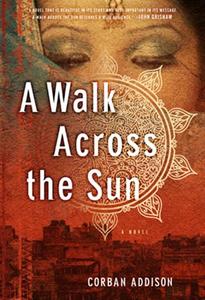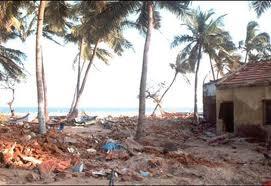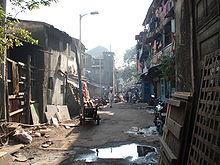A Walk Across the Sun by Corban Addison (SilverOak/Sterling, $24.95 hardcover, 9781402792809, January 3, 2012)
 A Walk Across the Sun is a debut novel about the sex-traffic trade in underage children. How can that be a satisfying read? Corban Addison has figured it out by combining a love story, two sisters' devotion and a man discovering his true self in this stunning, moving account of one of our world's great shames.
A Walk Across the Sun is a debut novel about the sex-traffic trade in underage children. How can that be a satisfying read? Corban Addison has figured it out by combining a love story, two sisters' devotion and a man discovering his true self in this stunning, moving account of one of our world's great shames.
Boxing Day 2004, the date that a tsunami hit southeast Asia: "The sea was quiet at first light on the morning their world fell apart." Ahalya, 17, is awakened at dawn by the earth shaking. She falls back to sleep and gets up later, after her younger sister, Sita. They breakfast with their parents and the four of them go for a walk on the beach in Chennai, in India. A charming morning, until Ahalya spots the wave.  The girls cling to palm trees until the water recedes, and see their world--parents and home--obliterated. Their only hope is to make their way to St. Mary's school. They find a ride but are taken not to St. Mary's, but to a dingy flat in a shady neighborhood and locked up. The next day they depart by train for Mumbai, after being sold for 13,000 rupees ($250). They are threatened--the police won't help because "the Deputy Commissioner is a friend"--and warned if one of them disobeys, the other will be punished.
The girls cling to palm trees until the water recedes, and see their world--parents and home--obliterated. Their only hope is to make their way to St. Mary's school. They find a ride but are taken not to St. Mary's, but to a dingy flat in a shady neighborhood and locked up. The next day they depart by train for Mumbai, after being sold for 13,000 rupees ($250). They are threatened--the police won't help because "the Deputy Commissioner is a friend"--and warned if one of them disobeys, the other will be punished.
 In Mumbai, they are sold to a brothel in Kamathipura, the red light district, for 40,000 rupees, a high price because they are lovely and are "sealed packs"--virgins. Filled with despair, they are told to accept their karma. After a few days in the brothel, they begin to lose touch with reality, or rather, with their previous reality. Their new world is "malignant, a soundscape of pounding feet, drunken shouts, squeals of seduction and protestation, and incessant moaning." When Ahalya is chosen to make her "debut," her virginity is sold for 90,000 rupees, and Sita is made to sit outside the room to listen: "It will be a good lesson for her." And so Ahalya becomes a beshya, a prostitute. The only way to survive is to sever her heart from her body, and she must survive in order to help Sita, still on the cusp of puberty.
In Mumbai, they are sold to a brothel in Kamathipura, the red light district, for 40,000 rupees, a high price because they are lovely and are "sealed packs"--virgins. Filled with despair, they are told to accept their karma. After a few days in the brothel, they begin to lose touch with reality, or rather, with their previous reality. Their new world is "malignant, a soundscape of pounding feet, drunken shouts, squeals of seduction and protestation, and incessant moaning." When Ahalya is chosen to make her "debut," her virginity is sold for 90,000 rupees, and Sita is made to sit outside the room to listen: "It will be a good lesson for her." And so Ahalya becomes a beshya, a prostitute. The only way to survive is to sever her heart from her body, and she must survive in order to help Sita, still on the cusp of puberty.
At the same time, on another continent, Thomas Clarke is on the way to Washington, D.C., from South Carolina, due at his parents' house for dinner on Boxing Day, a dinner he's dreading because he hasn't yet told them that his wife, Priya, has left him and gone back to Mumbai. Their marriage had been complicated, with cultural bridges uncrossed, disagreement about his job as a litigator and, most of all, the death of their infant daughter--a gulf their love couldn't close. When he stops at a park, he witnesses a young girl being abducted. He calls 911 and gives chase but loses the car, and learns that this is a not rare occurrence in the area--nearby Ft. Bragg offers pimps a steady client base.
Priya had hated everything about the law firm, but Thomas coveted what his father had, a seat on the federal bench, and his job is the first step. Unfortunately, the firm just lost a big case representing a coal mining company, and he's made the scapegoat for the failure. He feels like he's crawled into a deep hole; he needs a new perspective. That comes in a "suggestion" from his law firm: take a vacation or take a one-year, pro bono scholarship anywhere in the world. A Justice Department friend recommends CASE--the Coalition Against Sexual Exploitation. Thomas wouldn't have considered something like that a week earlier, but the park abduction had an impact on him. Coincidentally, a slot has just opened up in CASE's Mumbai office. He decides to take it--go to India, fight modern slavery, face his wife. And so the lives of Thomas and Ahalya and Sita are about to intersect.
 Of the many cities tied to sex trafficking, Mumbai is among the worst, and Thomas enters a world "as astonishing as it was troubling"--pimps, corrupt officials, dishonest police, crusading lawyers and an endless supply of women and children, with "stories of abuse as diverse as human cruelty." He soon participates in a brothel raid, where Ahalya is rescued and taken to an ashram run by the Sisters of Mercy. Before the raid, Sita had been sold for one lakh, 100,000 rupees--but the buyer has something other than sex in mind: Sita is to be a heroin mule, swallowing stuffed condoms and transporting drugs to Paris, where she is then turned over to a couple who own an Indian restaurant, to be their slave. She is sold over and over, each time for more money, and ends up in the U.S., still a sealed pack, still highly valuable.
Of the many cities tied to sex trafficking, Mumbai is among the worst, and Thomas enters a world "as astonishing as it was troubling"--pimps, corrupt officials, dishonest police, crusading lawyers and an endless supply of women and children, with "stories of abuse as diverse as human cruelty." He soon participates in a brothel raid, where Ahalya is rescued and taken to an ashram run by the Sisters of Mercy. Before the raid, Sita had been sold for one lakh, 100,000 rupees--but the buyer has something other than sex in mind: Sita is to be a heroin mule, swallowing stuffed condoms and transporting drugs to Paris, where she is then turned over to a couple who own an Indian restaurant, to be their slave. She is sold over and over, each time for more money, and ends up in the U.S., still a sealed pack, still highly valuable.
Ahalya's courage and resolve to protect and then to find her sister is matched by Sita's bravery and compassion for other girls she meets on her journey. But as she holds her statue of Hanuman and tries to pray, "her faith seemed incapable of bearing up the weight of her fear." And we feel the weight, too. "The sights and sounds of human depravity peeled the paint off the walls of the world, leaving it bare and bereft of goodness."
Ahalya charges Thomas with finding Sita, and binds him with a rakhi bracelet, which signifies that Thomas is now Ahalya's brother, and is duty-bound to act in her defense. But he's just a lawyer working for an NGO. What can he do? He has contacts--Interpol, the FBI and the Indian CBI (Central Bureau of Investigation)--and he has determination, fueled by his outrage at the trafficking, and buoyed by Priya's new belief in him.
As the story builds, the excitement increases along with the horror, and chapters that alternate between the sisters and Thomas is the perfect structure for this thriller. The counterpoint of Thomas and Priya's relationship, and the sisters' love for each other, are hopeful antidotes to the darkness, and while the subject of the book is beyond dark, Addison never crosses over into sensationalism.
Corban Addison writes clearly and fervently about underage sex trafficking, and his narrative is grim. One of the characters says, "The demand for commercial sex is extremely high in the U.S. Market forces will prevail in the long run. The traffickers will innovate and meet the demand.... Trafficking will stop when men stop buying women." When will that ever happen? And if one asks what difference rescuing two dozen underage beshyas makes, Addison says: It's what can be done. It's what must be done. As Mother Teresa said, "You do the thing that's in front of you." That's what Thomas Clarke does, that's what Ahalya and Sita do, that's what so many attempt in the war against this particular terror. --Marilyn Dahl

